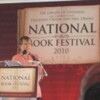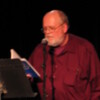Fanny Howe
Author of Selected Poems
About the Author
Fanny Howe is Professor Emerita of Writing and Literature at the University of California, San Diego.
Image credit: Poetry Foundation Website
Works by Fanny Howe
Children of the Cold War a Scapbook, Five Fingers Review 13 (FIVE FINGERS REVIEW, 13) (1994) 3 copies
Angria 2 copies
The Lamb 2 copies
Eggs 1 copy
Fanny Howe's Alsace-Lorraine 1 copy
Seen (in Granta 106 - CLARK) 1 copy
London-rose 1 copy
Associated Works
Mirror, Mirror on the Wall: Women Writers Explore Their Favorite Fairy Tales (1998) — Contributor — 303 copies, 4 reviews
Collective Brightness: LGBTIQ Poets on Faith, Religion & Spirituality (2011) — Contributor — 13 copies
Wreckage of Reason: An Anthology of Contemporary Xxperimental Prose by Women Writers (2008) — Contributor — 8 copies
Crayon 5: On Beauty — Contributor — 2 copies
Fire Exit 4 — Contributor — 1 copy
HOW(ever), Vol. 2, No. 1, November 1984 — Contributor — 1 copy
Hills #3 — Contributor — 1 copy
Fire Exit, Volume 1, Number 1 — Contributor — 1 copy
Hills #4 — Contributor — 1 copy
New World Journal #5 — Contributor — 1 copy
Telephone 14 — Contributor — 1 copy
Telephone 15 — Contributor — 1 copy
Telephone 17 — Contributor — 1 copy
Tagged
Common Knowledge
- Birthdate
- 1940-10-15
- Gender
- female
- Nationality
- USA
- Birthplace
- Buffalo, New York, USA
- Places of residence
- San Diego, California, USA
Cambridge, Massachusetts, USA - Education
- Stanford University (1961)
- Occupations
- university professor
poet
novelist
short story writer - Relationships
- Howe, Mark deWolfe (father)
Howe, Susan (sister)
Quaytman, R. H. (niece)
Quaytman, Harvey (brother in law)
Senna, Danzy (daughter) - Organizations
- Massachusetts Institute of Technology
Tufts University
University of California, San Diego - Awards and honors
- American Academy of Arts and Letters Academy Award (Literature, 2008)
Griffin Poetry Prize (2005)
Lenore Marshall Poetry Prize (2001)
Members
Reviews
Lists
Awards
You May Also Like
Associated Authors
Statistics
- Works
- 58
- Also by
- 22
- Members
- 743
- Popularity
- #34,185
- Rating
- 3.6
- Reviews
- 10
- ISBNs
- 78
- Languages
- 1
- Favorited
- 2






















All people seek great difficulty, no doubt about that; they seek and even create the situation which will be insurmountably problematic. It would be a strange person who did not know that suffering is a way to stay alive.
The night before she dreamed she had won the Nobel Prize for Despair.
From the beginning he held the tragic position that the only revolution was the eternal revolution – an inexhaustible struggle for something already lost.
Weak desires protect you from disappointment. But nothing keeps you safer than being a visible ruin.
Some people use the word affliction when they mean infliction. They think that making other people suffer is painful to them because someone else made them suffer first. Libby never blamed her life on her father interfering with her but she wished she was not the drunk that her mother was. She experienced her addictions not as afflictions but as weeds that grow in certain gardens wild. No matter how you tugged and pulled, you couldn’t ever get them all out of the ground.
His work was his obscurity. You can actually work in opposition to fame.
I was an existentialist, then I noticed how words could make things happy again. Many of the most lost people used the loveliest language in order to laugh.
The dialectic of the 20th century (determinism versus choice) is as old as the hills. But today I realized that a choice can be wrong. I used to think otherwise. Now I see that choices are so difficult because people know that they can make the wrong ones. But I think that if a choice is made against you to reject you, your work or your love for instance – it can’t be wrong. It can’t be wrong because it would always come to that, anyway. Sooner or later, you would be rejected by that party. And you would suffer throughout the whole process. So in a way what happens to you is pre-determined, but what you do is a choice.
What is sad to discover is that events in this world are both pre-determined and whipped up at the moment they are occurring. People are bewildered by this paradox unless they can grasp the difference between time and timing. It is like the way they write out their calendar, make predictions and watch events unfold according to plan… and then it all goes wrong and a choice becomes necessary.
.… (more)